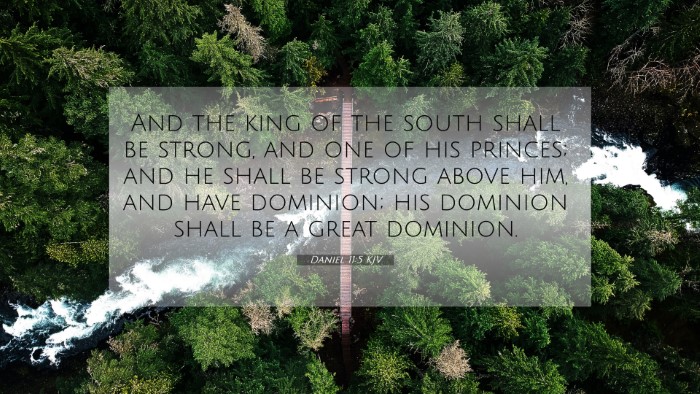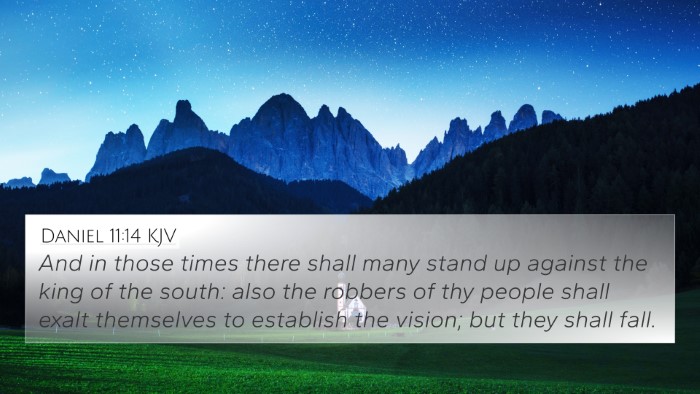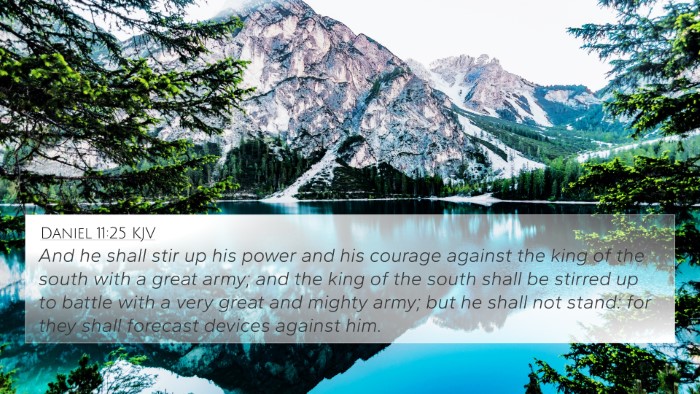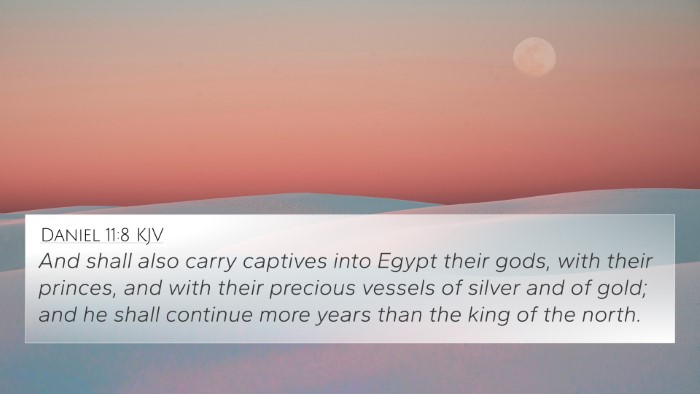Bible Verse Meaning: Daniel 11:5
Verse Context: The Book of Daniel contains prophetic visions concerning the rise and fall of empires, specifically focused on the struggles between the kings of the north and the south. In Daniel 11:5, it states, "And the king of the south shall be strong, and one of his princes; and he shall be strong above him, and have dominion; his dominion shall be a great dominion." This verse transitions us into a deeper understanding of the geopolitical landscape during the time of the Hellenistic rulers.
Interpretations and Insights
-
Matthew Henry's Commentary:
Matthew Henry emphasizes the prophetic nature of this verse regarding the contrasting powers of the kings of the south and north. He explains that the "king of the south" refers to Egypt and its rulers, while the "one of his princes" represents a strong successor who will rise to prominence. This verse illustrates a period of conflict and struggle, which symbolizes the broader themes of power dynamics and divine sovereignty.
-
Albert Barnes' Notes:
Albert Barnes points out that this passage highlights the geopolitical tensions of the time. He notes that the term "king of the south" signifies a strong leader emerging from Egypt. The phrase "great dominion" suggests a period of substantial influence and power, which aligns with historical accounts of the Ptolemaic dynasty's reign over Egypt.
-
Adam Clarke's Commentary:
Adam Clarke elaborates on the historical implications behind this verse. He draws connections to the historical context of the Ptolemies in Egypt and their interactions with other kingdoms. Clarke suggests that the emphasis is not merely on political power but also on the spiritual warfare inherent in these earthly struggles, suggesting a divine purpose guiding these events.
Connections to Other Bible Verses
This verse serves as a rich tapestry woven into the broader narrative of Scripture, leading to numerous cross-references that enhance its meaning:
- Daniel 8:20-21 - Discusses the ram (Medo-Persia) and the goat (Greece), setting the stage for understanding Daniel’s prophetic visions.
- Isaiah 19:4 - Prophecy concerning Egypt, which helps illustrate the plight of the southern kingdom during this period.
- Revelation 17:10-11 - Discusses kings and kingdoms, echoing themes of rise and fall that are present in Daniel.
- Ecclesiastes 1:9 - "There is nothing new under the sun," which aligns with the cyclical nature of history depicted in Daniel's prophecies.
- Jeremiah 46:25-26 - A prophecy against Egypt that reveals the turmoil within Egypt's ruling powers.
- Daniel 11:3 - The mention of a mighty king that shall arise, connecting the rise of the king of the south to the greater context of kingdom transitions.
- 2 Thessalonians 2:4 - References to the opposition to God’s sovereignty as seen in human rulers, connecting to the pride and ambition seen in the kings of the south and north.
Thematic Connections
The themes present in Daniel 11:5 relate to:
- Human Ambition vs Divine Sovereignty: The struggle for power portrayed in this verse reflects not only historical events but also a spiritual narrative where God’s hand is evident.
- Power Struggles: The contest between the south and north can be seen as a representation for broader spiritual conflicts, echoing throughout both testaments.
- Prophetic Fulfillment: This verse stands as a notable example of prophecy being fulfilled through historical events, demonstrating how biblical prophecy informs our understanding of God's overarching plan.
Conclusion
In summary, Daniel 11:5 serves not only as a historical account but as a profound exploration of divine providence amidst the interplay of human actions. The intertwining of political forces reflects the greater narrative of Scripture, emphasizing themes of sovereignty and fulfillment of prophecy. By cross-referencing this verse with others, we gain a clearer insight into God's eternal plan as it unfolds through earthly history.
Suggestions for Further Study
To deepen your understanding of Daniel 11:5 and the connections throughout the Bible, consider using:
- Bible concordance to identify keywords and themes.
- Bible reference resources for a broader context of the kingdoms discussed.
- Cross-reference Bible study methods to explore inter-Biblical conversations.








